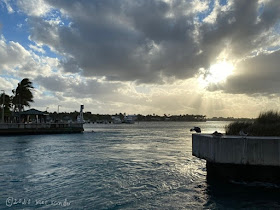
The old Everglades are gone. Draining a swamp used to be a metaphor for improvement of the mistakes that nature had made (or just for changing things to suit your desires). People aren't so sure any more that this alteration of the natural environment was a great idea, but it's essentially irreversible. In a few places there are efforts to restore swamp-like habitats for plants, birds, and animals; appreciation for the natural beauty of a swamp has replaced the old view that swamps were ugly and undesirable. The photo above shows the restored area at Wakodahatchee Wetlands, which opened in 1996. It is simultaneously a wildlife area and an open-water area that purifies waste water: the county sewage treatment plant is adjacent to the park-like wetlands, though you can’t see too much of the plant from the beautifully designed boardwalk.
This area of South Florida around Boynton Beach in Palm Beach County made me think about the former environment, the Everglades, and its replacement with the built-up environment of mansions on the beach, fishing piers and yacht harbors, giant shopping centers, vast gated condo communities, retirement homes and health clinics, wide roads and turnpikes, and all the other elements of city life. Throughout the region from Miami to at least Palm Beach, the swamps are gone, but you can see evidence of their history in the small ponds between the buildings of the condo complexes, along the roads, and in the parking lots of shopping malls and business centers. You can also see that builders try to beautify their creations -- at least sometimes.
 |
| An interesting sculpture decorates an apartment building. |
 |
| A mural of flowers & birds on the wall of an office building. People may love plants and birds -- but maybe not the natural ones! |
 |
| The intracoastal waterway is another example of the development of a man-made and controlled environment. |
 |
| Fishing from the pier at Boynton Beach inlet -- the built environment changes the natural environment -- drastically! |
A Japanese Garden: Taming Nature for Human Aesthetics
The Morikami Gardens in Delray Beach started as a project by Japanese immigrants in the Yamato Colony a small Japanese farming community nearby, and are now stunningly maintained by a foundation. Japanese gardens are a fascinating way to appreciate nature in a highly controlled way, and have been developed in Japan for many centuries. In the Morikami Gardens are examples of rock gardens and other types of gardens from several eras in Japanese history.
This blog post and all photos © 2020 by mae sander for maefood dot blogspot dot com.






It's a beautiful and very instructive report
ReplyDeleteLove that area of FL, but it has definitely changed over the years. I know a man who escaped into the Everglades to avoid the draft and was never seen or heard from again...
ReplyDeleteHello,
ReplyDeleteI would much prefer the swamp land of the Everglades than a concrete jungle. Buildings too close to the ocean, that will need insurance money to fix after they are hit by a big storm. I do love the Nanday Parakeet, I saw them on my most recent Florida trip. Have a happy day and week ahead!
The Japanese garden looks so beautiful.
ReplyDeleteI think south Florida is almost completely developed now, especially along the coast.
I have only been in Florida once and didn’t get to see as much as I wanted to. It is a shame how we humans destroy nature.
ReplyDeleteOne time I´d like to visit. It is beautiful, but often nature gets it´s structure back...
ReplyDeleteI've never been there, it looks beautiful and I like it mural, it's very bright and colourful, btw thanks for your comment at my blog.
ReplyDeleteWhat a fascinating and thought-provoking post, Mae. There's a lot of meat here, lots to think about. Beautifully photographed, too.
ReplyDeletei love japanese gardens - so soothing to the soul!
ReplyDeleteI do wonder if one day those buildings built over the swamps aren't going to just disappear due to some force of nature.
ReplyDeleteJapanese gardens are always so peaceful.
Lovely mural Mae, thanks for participating.
Great reportage.
ReplyDeleteWe camped once in the Everglades...it was a remote kind of campground and it was still a bit destroyed by Katrina..nice murals
ReplyDelete